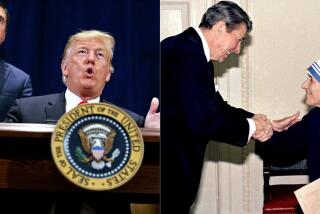Ready for the Decision
- Share via
President Reagan made the correct move Tuesday in softening the contentious remarks he had planned to deliver in New Jersey about the confirmation of Robert H. Bork to be associate justice of the U.S. Supreme Court. And then he promptly spoiled it.
In an early text of his proposed address, the President characterized the opposition to Bork as a “sophisticated campaign of smears and lies.” The White House properly had second thoughts about such harsh language and toned it down. But in another appearance later in the day, the President just could not resist. He turned defiant again and ad-libbed that if Bork is rejected by the full Senate, “I’ll try to find one that they’ll object to just as much” as Bork.
All sides in the Bork battle need to cool it. The Senate will debate and vote on Bork soon. By all odds, the nomination will be defeated and the President then can present another candidate. But the Supreme Court nomination and confirmation process need not, and should not, be corrupted by the Bork battle, as some fear. Every subsequent court nomination should not set off another monumental battle. The independence of the court has not suffered from this controversy, nor should it from future controversies over future nominations.
No one has doubted that Reagan would appoint another conservative if Bork was rejected, and the opposition has acknowledged that almost any other conservative would win confirmation easily.
The issue is not Bork’s intellect or his integrity or even his conservatism. But the tortured constitutional reasoning of some of his past writing has clouded with doubt any confidence in the course he might follow on the court. And his views on privacy and civil rights have inspired deep divisions in the nation, offending such a substantial number of people as to make confirmation unthinkable.
Surely Bork’s opposition did not distinguish itself with some of the political tactics it employed to defeat him. But the decision to appoint Bork in the first place was a political act. The White House had ample warning beforehand that confirmation would be difficult because of Bork’s controversial views. In the end, senators judged Bork on his record, on his testimony, and a majority has rejected him on that basis.
The President has a right to pursue the Bork issue to the end. But his unfortunate comments Tuesday undermine his contention that he is doing so strictly as a matter of principle. While the outcome is not in doubt, the Senate debate on Bork can be an illuminating discussion of the real issues involved. That can only happen, however, if the rhetorical smoke screen is allowed to clear.
More to Read
Get the L.A. Times Politics newsletter
Deeply reported insights into legislation, politics and policy from Sacramento, Washington and beyond. In your inbox twice per week.
You may occasionally receive promotional content from the Los Angeles Times.










